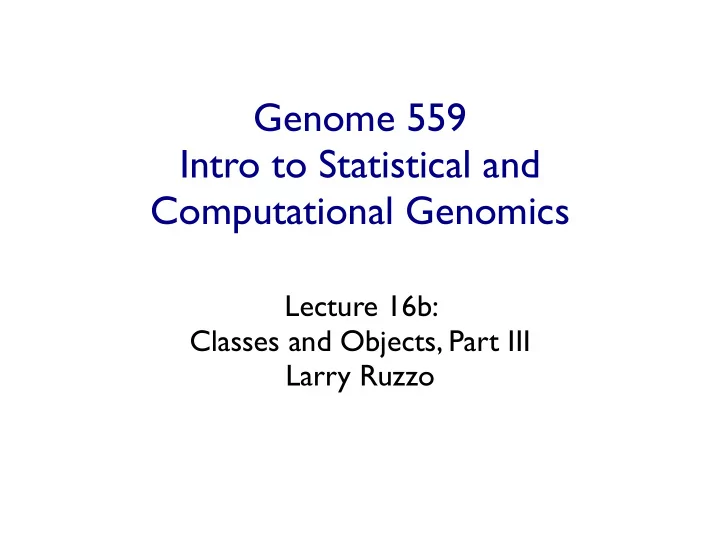

Genome 559 Intro to Statistical and Computational Genomics Lecture 16b: Classes and Objects, Part III Larry Ruzzo
Outline Printing more naturally “Operator Overloading” Inheritance Shallow copy/deep copy
Printing Objects Why is “print” fine for numbers, tuples, etc. >>> print ("Jan",5) ('Jan', 5) but funky for class instances? print mydate <_ _main_ _.date instance at 0x247468> Yes, mydate.printUS() works, but seems clunky
A better way to print objects Actually, “print” doesn’t have special knowledge of how to print numbers, strings, tuples, ... It just knows how to print strings, and relies on each class to have a _ _str_ _() method that returns a string representing the object. “<_ _main_ _.date instance at 0x247468>” is the result of calling the default _ _str_ _() method. You can write your own, tailored _ _str_ _() method to give prettier/more useful results
Printing dates class Date(object): def _ _init_ _(self, day, month) : self.day = day self.mon = month def _ _str_ _(self) : return ‘%s %s’%(self.mon, self.day) add(self, numdays) : (etc., as before) birthday = Date(3,”Sep”) print “It’s ”, birthday, “. Happy Birthday!” It’s Sep 3. Happy Birthday!
Advanced topic: Allowing the plus sign Similarly, how come “+” works (but differently) for numbers and strings and tuples and ..., but not for dates? Yes, this works : “party = mybirthday.addnew(4)” to add numbers to dates, but this: “party = mybirthday + 4” seems so much more natural. Can we do it?
Advanced topic: Overloading “+” Yes! Again, ‘+’ isn’t as smart as you thought; it calls class- specific “add” methods ( “_ _add_ _()” ) to do the real work: def _ _add_ _(self, numdays) : newmon = self.mon newday = self.day + numdays while newday > daysinmonth[newmon] : newday = newday - daysinmonth[newmon] newmonth = nextmonth(newmon) return Date(newday,newmon) # usage example mybirthday = Date(6,"Jul") party = mybirthday + 4 mybirthday._ _add_ _(4) print mybirthday, party Jul 6 Jul 10
Operator overloading This shows some of the power of classes in Python; we can make new classes, like Date, behave like built-in ones Operator overloads involve names with underscores Common operator overloading methods _ _init_ _ # object creation _ _add_ _ # addition (+) _ _mul_ _ # multiplication (*) _ _sub_ _ # subtraction (-) _ _lt_ _ # less than (<) _ _str_ _ # printing _ _call_ _ # function calls ... # And more: indexing, slicing, iteration, ... Try “ >>>dir(object) ” in Python to see what’s there
Pros and Cons Good aspects of operator overloading - Can make classes easier to use - Uniformity: use your own classes just like built-in ones Bad aspects: - Might obfuscate things (overload the + sign to do subtraction...) - The “implicit” function calls can be confusing to follow at first Net: an advanced technique you may or may not need Exceptions: almost all classes will need _ _init_ _ () functions, and _ _str_ _() is usually a good idea, too
Inheritance: do the common parts once S uperclass for seqs in general, with class Seq(object): appropriate methods common to all def print_FASTA(self): ... class DNA(Seq): def digest(self): ... Separate subclasses for protein vs DNA sequences, with methods def rev_comp(self): ... appropriate to each class Prot(Seq): def digest(self): ... myseq = DNA(file.readline()) myseq is a “DNA” object; doesn’t frags = myseq.digest() have a “print_FASTA” method, but myseq.print_FASTA() inherits it from Seq superclass A key OO feature; done well, saves much work (done poorly–can be very confusing)
“Classes”: Summary Most useful in (but not restricted to) large programs Classes package together related data plus the functions (“methods”) appropriate thereto Method calls automatically find the def of the given name within their own class, not some other one spelled the same The relevant object is always passed to the method as its 1st parameter, called “self” by convention Method names starting & ending with “_ _” are special, allowing “operator overloading” and other emulation of “standard” behavior
Feedback Please go to WebQ link next to HW6 on class home page & fill out.
Practice Definitely try dir(x) for x= some string, some int, some list, your Date class More play with Date example, esp. add __str__ Try Seq/DNA/Prot example from 3 slides back. for prot.digest, just split on “W”, say; DNA, on “AAA” What should digest return? do rev, maybe rev_compl
Recommend
More recommend